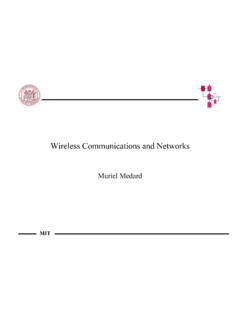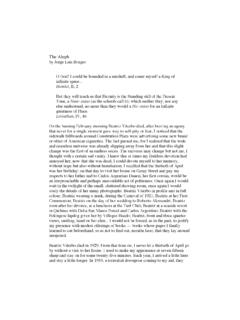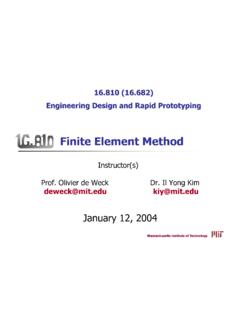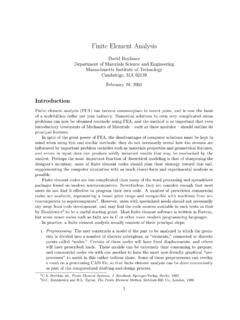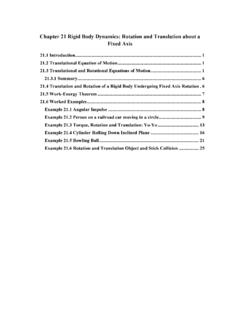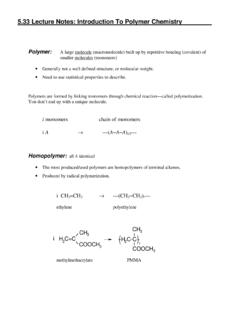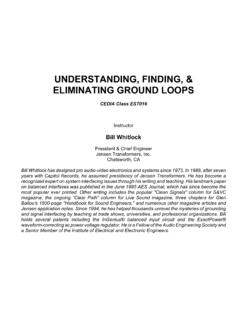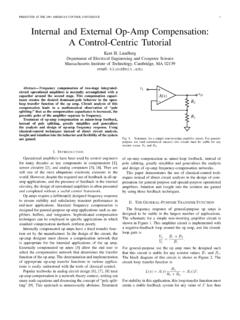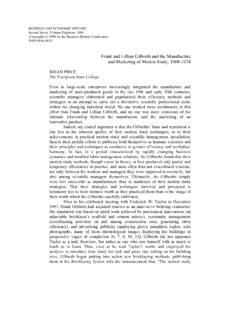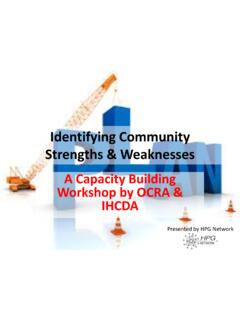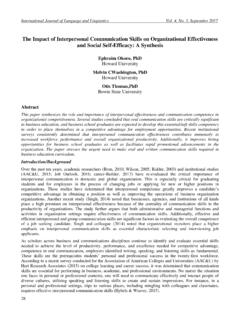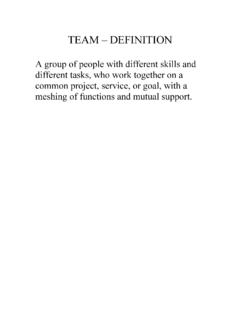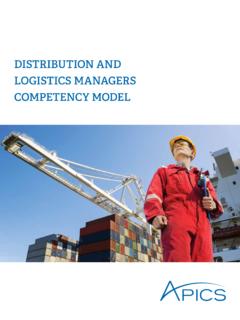Transcription of Task Versus Relationship Conflict, Team Performance, and ...
1 Journal of Applied Psychology Copyright 2003 by the American Psychological Association, Inc. 2003, Vol. 88, No. 4, 741 749 0021-9010/03/$ DOI: RESEARCH REPORTS. Task Versus Relationship Conflict, team performance , and team Member Satisfaction: A Meta-Analysis Carsten K. W. De Dreu Laurie R. Weingart University of Amsterdam Carnegie Mellon University This study provides a meta-analysis of research on the associations between Relationship conflict, task conflict, team performance , and team member satisfaction. Consistent with past theorizing, results revealed strong and negative correlations between Relationship conflict, team performance , and team member satisfaction.
2 In contrast to what has been suggested in both academic research and introductory textbooks, however, results also revealed strong and negative (instead of the predicted positive) corre- lations between task conflict, team performance , and team member satisfaction. As predicted, conflict had stronger negative relations with team performance in highly complex (decision making, project, mixed) than in less complex (production) tasks. Finally, task conflict was less negatively related to team performance when task conflict and Relationship conflict were weakly, rather than strongly, correlated. teamwork in organizations is increasingly the norm, yet the a potential moderator, and evaluate the empirical support through challenges of working effectively in teams are considerable.
3 One a meta-analysis. challenge is conflict the process resulting from the tension be- tween team members because of real or perceived differences (De Dreu, Harinck, & Van Vianen, 1999; Thomas, 1992; Wall &. Conflict and team Effectiveness Callister, 1995). Because team members contribute to the team Early conflict and groups theorists have focused on the negative through social inputs and task inputs ( , Forsyth, 1983), conflict effects of team conflict (Brown, 1983; Hackman & Morris, 1975;. in teams is concerned with Relationship and task issues ( , Pondy, 1967; Wall & Callister, 1995). Conflict has been suggested Amason & Schweiger, 1997; Cosier & Rose, 1977; Guetzkow & to interfere with team performance and reduce satisfaction because Gyr, 1954; Jehn, 1997; Kabanoff, 1991).
4 Examples of Relationship it produces tension, antagonism, and distracts team members from conflict are conflicts about personal taste, political preferences, performing the task. Empirical evidence has supported the nega- values, and interpersonal style. Examples of task conflict are tive Relationship between conflict and team productivity and sat- conflicts about the distribution of resources, procedures and poli- isfaction (Gladstein, 1984; Saavedra, Earley, & Van Dyne, 1993;. cies, and judgments and interpretation of facts. In the past 10 years, Wall & Nolan, 1986). Deutsch (1973), Coser (1956), and Walton there has been a growing tendency in the literature to assume that, (1969) recognized that low levels of conflict could be beneficial.
5 Although Relationship conflict hurts team effectiveness, task con- When in conflict, people confront issues, learn to take different flict can, under certain circumstances, be beneficial to team effec- perspectives, and need to be creative (see also Levine, Resnick, &. tiveness ( , Amason, 1996; De Dreu & Van de Vliert, 1997; Higgins, 1993; Nemeth, 1986; Tjosvold, 1997). When conflict is Jehn, 1995; Simons & Peterson, 2000). In the current article, we absent, teams might not realize that inefficiencies exist. Indeed, review the arguments for and against this idea, discuss task type as research by Schulz-Hardt, Mayer, and Frey (2002) showed that teams made better decisions when prediscussion preferences were in disagreement rather than agreement.
6 Schwenk (1990) summa- Carsten K. W. De Dreu, Department of Psychology, University of rized research on devil's advocacy and found that individuals Amsterdam, the Netherlands; Laurie R. Weingart, Graduate School of exposed to a devil's advocate made better judgments than individ- Industrial Administration, Carnegie Mellon University. uals not exposed to a devil's advocate. Finally, research on team Financial support was provided by a grant of the Carnegie-Bosch decision making by Hollenbeck et al. (1995, 1998) indicated that, Institute awarded to Laurie R. Weingart and Carsten K. W. De Dreu. We all else equal, team members whose recommendations are uncor- thank the authors of the unpublished articles included in this research for related or negatively correlated ( , conflict) provide more value their generous help.
7 As a unit than do team members whose recommendations are Correspondence concerning this article should be addressed to Carsten K. W. De Dreu, Department of Psychology, University of Amsterdam, correlated high and positive (and hence redundant). Roetersstraat 15, 1018 WB Amsterdam, the Netherlands, or to Laurie R. Although a prediscussion disagreement appears to stimulate the Weingart, Graduate School of Industrial Administration, Carnegie Mellon quality of group decision making, this positive effect breaks down University, Pittsburgh, Pennsylvania 15213. E-mail: quickly when conflict becomes more intense. Carnevale and Probst or (1998) showed that, compared with a control condition in which no 741.
8 742 RESEARCH REPORTS. conflict was induced, participants were more flexible in their flict have consistently been found to negatively relate to team thinking and more creative in their problem solutions when they member satisfaction ( , Amason & Schweiger, 1997; Jehn, anticipated a cooperative negotiation (low conflict) with another 1995), there appears to be a disconnect in the literature on team individual. When participants anticipated a competitive, hostile conflict between theorizing ( , task conflict can be good, rela- negotiation (high conflict), however, cognitive flexibility and cre- tionship conflict is bad) and the empirical evidence.
9 Thus, it is ative thinking decreased substantially. Carnevale and Probst ex- unclear whether the perspective proposed by Jehn should be fa- plained these effects in terms of cognitive load as conflict inten- vored to the information processing perspective, which suggests sifies and arousal increases, cognitive load increases, which that (both task and Relationship ) conflict interferes with team interferes with cognitive flexibility and creative thinking. All in performance . all, this information-processing perspective suggests a moderate To examine the validity of these contrasting perspectives on the negative correlation between conflict and team performance : A conflict team performance Relationship , we conducted a quantita- little conflict stimulates information processing, but as conflict tive review (using meta-analysis) of the team conflict literature.
10 Intensifies, the cognitive system shuts down, information process- We examined the associations between task and Relationship con- ing is impeded, and team performance is likely to suffer. flict with team performance and team member satisfaction. We Jehn (1994, 1995, 1997) proposed an alternative perspective by included satisfaction as a dependent variable to determine whether differentiating between task and Relationship conflict, noting that conflict effects on satisfaction parallel those for team performance . although Relationship conflict generally decreases satisfaction and We contrasted two perspectives about the conflict team perfor- interferes with task performance , task conflict can be beneficial to mance satisfaction Relationship .
